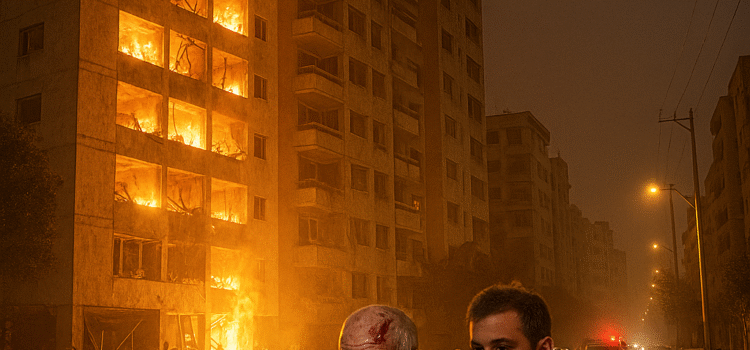In a dramatic escalation of tensions in the Middle East, Iran launched more than 100 missiles at Israel, striking the major cities of Tel Aviv and Haifa. The missile barrage, carried out early Monday, left four Israelis dead and dozens injured, marking one of the most dangerous developments yet in a rapidly intensifying regional war.
Tel Aviv and Haifa Under Fire
According to Israel’s Magen David Adom emergency services, four people—two women and two men, all around 70 years old—were killed in central Israel, while 87 others sustained injuries from multiple missile strikes.
Petah Tikva, a city near Tel Aviv, was among the hardest hit. Local authorities reported that a residential building was severely damaged—windows blown out, walls blackened, and apartments turned into rubble. Rescue operations continued late into the night.
Up north in the port city of Haifa, Iranian missiles wounded at least 30 people and caused fires at a nearby power plant, according to emergency officials. Videos circulated on social media showed plumes of smoke and fire lighting up the night sky.
A Calculated Retaliation by Iran
Iranian state television confirmed the attack, labeling it as a direct retaliation for Israel’s surprise assault on Tehran last Friday, which targeted Iran’s nuclear facilities and eliminated several senior members of its Revolutionary Guard, including intelligence chief Mohammad Kazemi.
What makes this counterattack even more concerning is Iran’s claim that it used a new strike technique that allegedly tricked Israel’s advanced defense systems into targeting themselves. While that detail remains unverified, the results speak volumes: several Israeli cities suffered significant damage despite the presence of the renowned Iron Dome.
The Human Toll Mounts
Monday’s strike was just the latest in a series of deadly exchanges. Prior attacks left at least 14 people dead in Israel, including children, while Iran’s health ministry reported over 224 Iranian fatalities, most of them civilians. The humanitarian crisis is growing on both sides.
In Tehran, chaos unfolded as terrified residents fled or sheltered from incoming airstrikes. A massive explosion at a fuel depot lit up the skyline after Israel reportedly struck Iran’s energy infrastructure, threatening further damage to the nation’s already-strained economy.
Global Powers Alarmed
As world leaders gathered in Canada for the G7 summit, the conflict dominated discussions. German Chancellor Friedrich Merz stated that preventing Iran from acquiring nuclear weapons, ensuring Israel’s right to self-defense, and pushing for de-escalation were key priorities.
Before departing for the summit, U.S. President Donald Trump told reporters, “I hope there’s going to be a deal. I think it’s time for a deal. Sometimes they have to fight it out.”
However, sources told Reuters that Trump recently blocked an Israeli plan to assassinate Iran’s Supreme Leader Ayatollah Ali Khamenei, a move that could’ve triggered a much wider war. The Israeli government has neither confirmed nor denied the report.
“We Do What We Need to Do”
In an interview with Fox News, Israeli Prime Minister Benjamin Netanyahu avoided addressing the alleged plan but insisted, “We do what we need to do.” Israel has vowed to intensify its campaign in the coming days.
Iran, meanwhile, has refused calls for a ceasefire. Mediators from Qatar and Oman were reportedly told that Tehran won’t consider negotiations while under active attack.
The World Watches Anxiously
With oil prices climbing and fears of a full-blown Middle East war looming, world markets are already reacting. Energy infrastructure in Iran has been targeted, raising concerns about global supply chains and economic stability.
This isn’t just a regional dispute anymore—it’s a geopolitical flashpoint with the potential to redraw alliances and destabilize the international order.
As both nations dig in, the coming days could determine whether diplomacy prevails or the Middle East plunges deeper into chaos. For now, all eyes remain on Tel Aviv, Tehran, and the tense corridors of international diplomacy.






